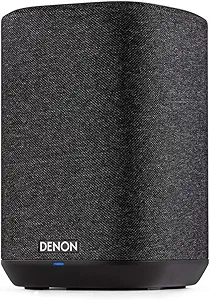In the pursuit of sonic perfection, the choice of speakers holds paramount importance. Yamaha and Denon, two stalwarts in the audio industry, present enthusiasts with a tantalizing array of speaker options, each promising a unique auditory journey. This article aims to dissect and compare the features, performance, and ethos of Yamaha and Denon speakers, offering insights to aid discerning listeners in their quest for the ideal audio companion.
Brand Overview
Yamaha, synonymous with innovation and excellence in audio engineering, stands as a beacon of reliability and quality. Yamaha speakers embody a harmonious blend of meticulous craftsmanship and cutting-edge technology, resulting in an audio experience that transcends expectations. Known for their clarity, precision, and immersive soundstage, Yamaha speakers cater to a wide spectrum of audio aficionados, from discerning audiophiles to casual listeners seeking uncompromising quality. Whether it's the warm, natural tones of their bookshelf speakers or the thunderous impact of their home theater systems, Yamaha consistently delivers audio fidelity that captivates the senses. Moreover, Yamaha's commitment to versatility is evident in their diverse lineup, offering solutions tailored to different environments, preferences, and budgets.
Denon, revered for its legacy of audio excellence spanning over a century, continues to push the boundaries of innovation with its speaker offerings. Denon speakers are renowned for their refined sound signature, characterized by a meticulous balance of detail, dynamics, and musicality. From Hi-Fi purists to home theater enthusiasts, Denon speakers cater to discerning listeners seeking a transcendent auditory experience. Leveraging advanced technologies such as advanced driver designs, acoustic tuning, and proprietary signal processing, Denon speakers deliver a level of sonic immersion that transports listeners into the heart of the music or movie soundtrack. Furthermore, Denon's dedication to user experience shines through in features such as wireless connectivity, voice control compatibility, and intuitive setup, ensuring hassle-free integration into modern lifestyles.
Key Features Comparison
Size
Yamaha and Denon are both reputable brands in the audio industry, known for their high-quality speakers. However, when it comes to the aspect of size, there are noticeable differences in their product offerings. Yamaha speakers, particularly their home theater and bookshelf models, are often compact and designed to fit into various spaces easily. For instance, their latest NS-333 bookshelf speakers are designed with a slim profile, making them ideal for smaller rooms or spaces. This compact size, however, does not compromise the sound quality, as Yamaha incorporates advanced technologies such as Acoustic Dispersion Prism System for a more immersive sound experience. On the other hand, Denon speakers, especially their floor-standing models, are typically larger and more robust. The Denon DHT-S716H, for example, is a sizable soundbar that delivers powerful sound performance. The larger size of Denon speakers often allows for more advanced audio technologies and larger drivers, which can result in a richer, fuller sound. However, the larger size may not be suitable for all spaces and may require a more significant investment in terms of room. Comparatively, both brands offer excellent sound quality, but the choice between them may come down to the size constraints of your listening environment.
Product Selection
Yamaha and Denon are two major brands in the audio industry, each offering a wide selection of speakers for various uses. Yamaha's product range is expansive, encompassing everything from home theater systems to professional studio monitors, outdoor speakers, soundbars, and more. Their latest technologies include MusicCast for multi-room audio, Advanced YST II (Yamaha Active Servo Technology II) for improved bass response, and DTS:X for immersive 3D sound. Yamaha's broad product selection allows for a high degree of customization and flexibility, catering to both casual listeners and professional audio engineers. On the other hand, Denon's speaker selection, while not as extensive as Yamaha's, is highly focused on home audio solutions. Their product range includes home theater systems, soundbars, and Hi-Fi speakers. Denon's latest technologies include HEOS for multi-room audio, Audyssey MultEQ for room acoustic correction, and Dolby Atmos for immersive 3D sound. Despite a narrower product selection, Denon's speakers are renowned for their exceptional sound quality and build, making them a favorite among audiophiles. Both brands offer a diverse range of products, but Yamaha may be more suitable for those looking for a wider selection, while Denon caters more to home audio enthusiasts with a preference for high-quality sound.
Availability
When it comes to the availability of audio equipment, both Yamaha and Denon have a strong presence in the market. Yamaha, a Japanese multinational corporation, has a wide range of speakers available globally. They offer a variety of models, from budget-friendly to high-end, catering to a broad spectrum of customers. Their speakers are readily available in physical stores and online platforms, with a strong presence on major e-commerce websites like Amazon, Best Buy, and their own official website. Denon, on the other hand, another Japanese brand, also has an extensive range of speakers available worldwide. They offer a variety of models, from home theater systems to high-end audiophile-grade speakers. Denon speakers can be found in many electronics stores and are also widely available online. They have a strong online presence on their own website as well as on other major online retailers like Amazon and Best Buy. However, compared to Yamaha, Denon's availability might be slightly less in some regions, but this does not compromise the quality and performance of their products.
Design/Look
When it comes to the design aspect of Yamaha and Denon speakers, each brand has its unique characteristics that set them apart. Yamaha speakers are known for their classic and traditional design, often featuring a box-like shape with a wooden finish that can blend seamlessly into any room decor. The latest models, such as the Yamaha NS-5000, maintain this timeless design while incorporating modern technology like the ZYLON woofer for superior sound quality. However, the design of Yamaha speakers may not appeal to everyone, especially those who prefer a more modern and sleek aesthetic. On the other hand, Denon speakers are recognized for their contemporary and sleek design. They often feature a more rounded and compact shape, with a minimalist aesthetic that can fit into modern interiors. The Denon Home 350, for instance, boasts a sophisticated design with its premium materials and a touch-sensitive panel. However, while Denon's design is visually appealing, it may not be as durable as Yamaha's, especially for larger speaker models. Compared to other brands, both Yamaha and Denon have their unique design language, with Yamaha leaning towards a more classic look, while Denon opts for a more modern and sleek design.
Affordability
In terms of price, both Yamaha and Denon speakers offer a wide range of options catering to various budget constraints. Yamaha speakers are generally known for their affordability without compromising on quality. For instance, the latest Yamaha NS-6490 3-Way Bookshelf Speakers are priced at around $130, which is quite reasonable considering their superior sound quality and durability. On the other hand, Denon speakers, while slightly more expensive, justify their price with advanced features and technologies. The Denon Home 350 Wireless Speaker, for instance, is priced at around $700 but includes high-resolution audio support, HEOS built-in for multi-room streaming, and voice control compatibility. While Yamaha speakers offer excellent value for money, Denon speakers are more about premium features and high-end performance. It's worth noting that while Denon speakers are generally more expensive than Yamaha, they often incorporate more advanced technologies, such as Dolby Atmos and DTS:X for immersive sound experiences. However, the price difference between Yamaha and Denon speakers can be significant, making Yamaha a more budget-friendly option. In comparison to other brands, both Yamaha and Denon offer competitive pricing, with Yamaha being a more affordable choice and Denon catering to the higher end of the market.
Quality/Durability
Yamaha and Denon speakers are both well-regarded in the audio industry for their quality and durability. Yamaha speakers are known for their excellent sound quality, with the latest models featuring technologies such as Advanced YST II (Yamaha Active Servo Technology II) that enhances the overall audio performance. They are also renowned for their durability, with robust construction and high-quality materials that can withstand long-term usage. However, some users have reported that Yamaha speakers may lack in the bass department, which may be a downside for those who prefer a more balanced sound profile. On the other hand, Denon speakers are praised for their rich and immersive sound, thanks to their advanced technologies like HEOS built-in for multi-room streaming and voice control compatibility. Denon speakers are also built to last, with many models featuring a rugged design that can resist wear and tear. However, some users have noted that Denon speakers can be quite complex to set up and use, especially for those who are not tech-savvy. Compared to other brands, both Yamaha and Denon offer high-quality and durable speakers, but the choice between the two may ultimately come down to personal preference in sound profile and ease of use.
Reputation
Yamaha and Denon are two reputable brands in the speaker industry, both known for their commitment to sound quality and innovation. Yamaha, a Japanese multinational corporation, has a long history of producing a wide variety of products, including speakers. Their speakers are recognized for their durability and excellent sound reproduction. They have consistently kept up with the latest technologies, incorporating features like MusicCast multi-room technology and built-in voice control from Alexa and Google. Yamaha speakers are often praised for their balanced and natural sound, making them popular among audiophiles. On the other hand, Denon, another Japanese brand, has a reputation for being a high-end provider of audio equipment. Their speakers are known for their sleek design and superior sound quality. Denon speakers often incorporate HEOS technology, allowing for seamless integration into a home network for easy streaming. While Denon speakers may come at a higher price point than Yamaha, many users find the audio quality to be worth the investment. However, it should be noted that while both brands are highly regarded, the choice between Yamaha and Denon often comes down to personal preference, as each brand has its unique sound signature.
Sound Quality
Yamaha and Denon are two reputable brands in the speaker industry, both known for their high-quality sound systems. When it comes to sound quality, each has its own strengths and weaknesses. Yamaha speakers are renowned for their Natural Sound technology, which aims to reproduce all music as it really sounds, with no artificial colors or alterations. This results in a clear, detailed, and balanced sound that is particularly appreciated by audiophiles. However, some users have noted that Yamaha speakers can sometimes lack in bass, which can affect the overall sound experience, particularly for certain types of music. On the other hand, Denon speakers are known for their HEOS technology, which delivers high-quality wireless audio throughout any room or even the entire home. This technology allows for a more immersive sound experience. Denon speakers are also praised for their rich and powerful bass, which can make music and movies feel more alive. However, some users have reported that Denon speakers can sometimes overemphasize the bass, which can drown out the mid and high frequencies. This can result in a less balanced sound compared to Yamaha speakers. Both brands have their own unique sound signatures and cater to different listener preferences, making them both strong contenders in the market for high-quality sound systems.
Related Video
Conclusion
Yamaha and Denon speakers both offer a range of products that incorporate the latest technologies in audio engineering. Yamaha speakers are well-known for their Sound Projection technology, which ensures that sound is evenly distributed throughout the room. This technology, coupled with the brand's reputation for producing speakers with excellent sound quality, makes Yamaha a popular choice among audiophiles. However, some users have noted that Yamaha speakers can be quite heavy and bulky, which may not be ideal for those with limited space. On the other hand, Denon speakers are lauded for their HEOS technology, which allows for seamless integration with other HEOS-enabled devices for a multi-room audio experience. This makes Denon speakers an excellent choice for those looking to create a comprehensive home audio system. However, some users have reported that the setup process for Denon speakers can be quite complex, particularly for those who are not technologically savvy. In terms of sound quality, Denon speakers are comparable to Yamaha, although some users have noted that Yamaha speakers tend to produce a warmer sound.




















